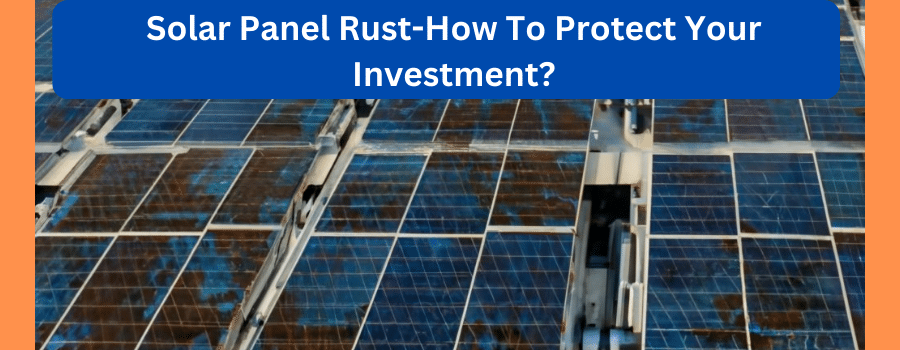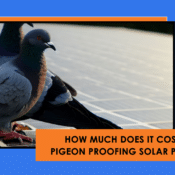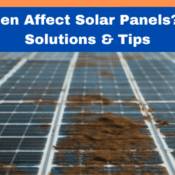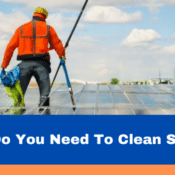Would you know that how to protect solar panel from rust. Solar panels play a vital role in the transition to renewable energy sources. They are not only used to convert sunlight into electric current but also minimize the negative impacts of greenhouse gas emissions. Like any technology, they also come up with many challenges.
The phenomenon of solar panel rust is one of the major concerns when considering the maintenance of solar panels. Rust can greatly impact the efficiency and life span of panels. In this post, we dive into the reasons, impacts, and effective solutions to combat rust formation on solar panel systems.
What is meant by solar panel rust?
Rust is a type of corrosion that mainly targets the metallic components of solar panels. These panels are constructed of various components like electrical connectors, metallic frames, and some conductive elements. When these metallic components are exposed to moisture or other environmental conditions, it can lead to corrosion.
Corrosion can cause rust and ultimately degrade the metallic components of solar panels. If this rust remains unnoticed for longer periods, can reduce the efficiency and output energy of solar panels.
It is essential to make it clear that the solar panel itself is not made of any metal, but the solar panel sheet holding frame is made up of metal. The mounting system is also generally made up of metals, these parts can get rusted due to several reasons. Hence Solar panels affected by rust generally mean that the mounting frame is rusted.
What are the factors leading to solar panel rust?
There are several factors involved in the rust formation on solar panels. Some of the key factors are as follows;
- Moisture: The solar panels are mounted in open environments, highly susceptible to various outdoor conditions like rain, snow, humidity, and temperature changes. The moisture components act as a catalyst to start and promote the electrochemical reactions with metals leading to rust formation.
- Other environmental conditions:
- In coastal regions, solar panels are exposed to salt-laden air. The corrosive nature of salt ultimately results in the formation of rust on them.
- If solar panels are installed in an acidic environment, acid rain can easily rust and damage their protective coatings.
- Fertilizers and industrial chemicals present in the environment can react with the metallic components and accelerate corrosion.
- Material Choice: The choice of materials used in the assembly of solar panel frames considerably impacts their susceptibility to rust formation. For example, aluminum is used for this purpose due to its rust resistance and lightweight properties.
- Poor manufacturing quality: If solar panels have defective manufacturing practices and are of poor quality, they are more vulnerable to rust formation. Insufficient sealants and inadequate coatings can rapidly deteriorate the panels’ structural formation.
- Neglected inspection: Regular inspection and maintenance of solar panels help prevent the damaging impacts of rust formation. If neglected or not cleaned appropriately, panels are highly exposed to certain chemicals and increase the risk of corrosion.
Impacts of solar panel rust
Rust can affect the optimum efficiency and longevity of solar panels in several ways;
- Structural integrity
Rust formation on the metallic frames and mounted structure can lead to cracks in the solar panels’ support. If not examined at the right time, it will damage the entire framework into bits.
- Financially loss
Losing your Solar system due to rust formation badly impacts your finances and savings. Your budget will be disturbed and expenses will be increased due to electrical bills.
- Reduced efficiency
Another essential component of solar panels made of metals is heat exchangers. Due to their composition, they are more susceptible to rusting which hampers their durability. Any damage to exchangers can reduce the overall efficiency of solar panels.
Guidelines to repair solar panel rust
Let’s dive into the step-by-step instructions on how to repair parts of solar panels affected by rust.
- 1st Step: Cleaning of the affected area
Cleaning the affected part is the initial step to repairing solar panel rust. Wash the rusty area with soapy water (a mixture of mild detergent and water). Use sponge brushes to scrub the surface, rinse with water thoroughly, and let it dry completely.
- 2nd Step: Sanding
The second step after cleaning is to use fine-grit sandpaper. Apply it gently on the surface of the rusted part in a circular motion to get rid of any remains of the rust. Try to apply sanding gently to prevent any damage to the panel coating. Sanding insistently with pressure can destroy protective coatings.
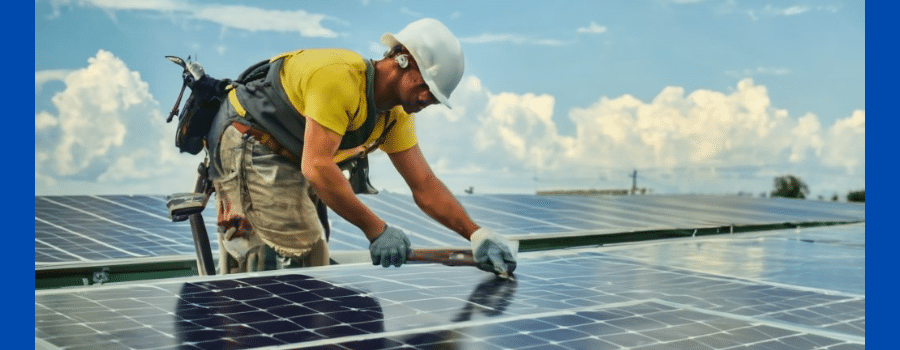
- 3rd Step: Coating
Once the solar system is entirely cleaned from rust, you are advised to apply protective coatings on the affected portions. These coatings will save your panels from rusting in the future.
Precautions to avoid solar panel rust
It is essential to take precautions to minimize the risks of damage to solar panels and maximize their efficiency and performance. Here are some preventive measures that will help you to protect your panels from rust formation.
- Regular maintenance: Inspect and clean your panels regularly to prevent the accumulation of dirt, dust, or pollen on the surface of the panels. These contaminants provide a favorable environment for rusting.
- Good Quality Materials: It is highly recommended to use all the components that compile the entire framework of panels, which are of good quality and anti-corrosion agents. In this manner, your panels will be less susceptible to moisture and rust formation.
- Protective coatings: These coatings aid in preventing rust damage and protect the panels’ surface from environmental conditions. Apply those coatings that are vulnerable to corrosion and compatible with the metals used in the construction of panels.
- Professional installation: Hire professionals to install your panels appropriately. Improper installation and sealing of solar panels increases the risk of moisture exposure and consequent rust formation.
- Environmental evaluation: It is vital to consider the environmental conditions in which your solar panels are installed. If located in arid or coastal regions with high pollutants and humidity, your panels need to be maintained with additional precautions. Consult with cleaning experts for better suggestions.
Conclusion about How to Protect solar panel from rust?
As solar systems are constantly emerging as advanced technology to generate electricity, it is imperative to consider its challenges like solar panel rust. By understanding the factors leading to rust formation, and its impacts and executing effective measures, you can repair rusty areas of solar panels.
You can also prevent your panels from further damage with regular maintenance, using protective coatings, and choosing good quality materials. This ensures the maximum output of your investment and longevity of solar panels.
Frequently Asked Questions
How does rust formation occur?
The mounting frame of solar panels is made from metal mainly from iron. When exposed to water and oxygen, iron is converted to iron oxide leading to rust formation.
Are there any impacts of rust on solar panel efficiency?
The build-up of rust can lead to cracks and damage the structural integrity of the entire framework. Therefore, it badly impacts the functionality and results in expensive repairs or replacements.
How to repair rusted components of solar panels?
Rusted or affected areas can be repaired by applying protective coatings followed by cleaning and sanding those components of solar panels.
How can you prevent solar panel rust?
You can prevent your panels by using rust-resistant coatings over the metallic frames. It will not permit the entrance of dirt or debris on the metals, prevent corrosion, and guarantee the integrity of the solar system.

